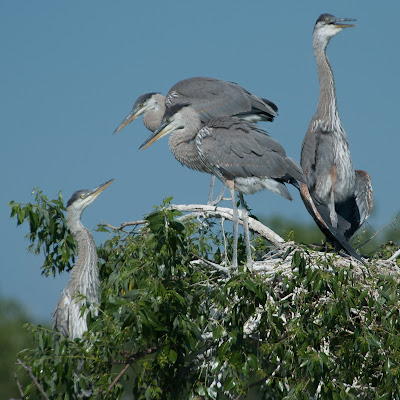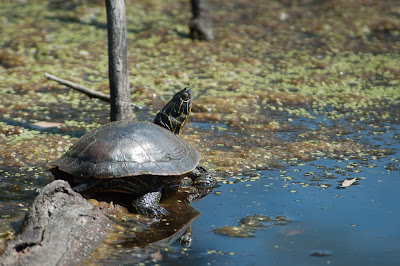Click here for Part I.
I often wonder what attracts animals to a particular spot repeatedly for nesting or feeding. Like the UT Southwestern rookery in Dallas for herons and egrets, or Brainard Lake for moose. Kountze Lake seems similar for its population of wading birds. I look at other areas nearby these places that would seem just as appealing if not more so -- say, with less human activity. But since I'm neither a bird nor a moose, I suppose I don't really know what's best for them. That's a concept that would likely benefit me to apply to other areas, too.
Barn swallows had nests under the roofs of the wooden boardwalk. Conditions were too dark for me to get shots of the babies. But when one landed briefly -- the only way swallows seem to ever land -- on an exposed piece of wood I managed to get a shot before it flew off.
The heron fledgling on the right was doing some gular fluttering as the day began to heat up. The other three seemed engaged in some sort of bizarre staring contest.
I only saw one Black-crowned Night-Heron. And like the ones in Dallas, this one was not interested in emerging from beneath sheltering trees to give me a shot with consistent contrast.
There were many Cabbage White butterflies flitting about, enjoying the wildflowers.
This Western Painted Turtle had a different reaction to the warm sun than the fledgling heron did. He seemed to be quite fine with it.
The elegance of this Snowy Egret searching for food in the shallow water seemed better suited for black and white.
Great Blue Herons seem simultaneously powerful and effortless when they fly. It's an odd apparent contradiction.
This American Robin was sitting quite contentedly on the ground. A little too contentedly, so I was concerned it might be hurt. But as I approached it eventually got up and ran off a short ways and then took flight.
No American Avocets, but certainly enough other accommodating subjects that the visit was a huge success. I was actually told by another photographer that he was pretty sure the avocets had all left a couple of weeks earlier once their babies had all been eaten. Apparently the herons, carp, and others eat all the baby avocets every year, and yet they still come back to nest. And I don't think one has to be an avocet to realize that they're a group that might do well to consider going someplace else!








No comments:
Post a Comment